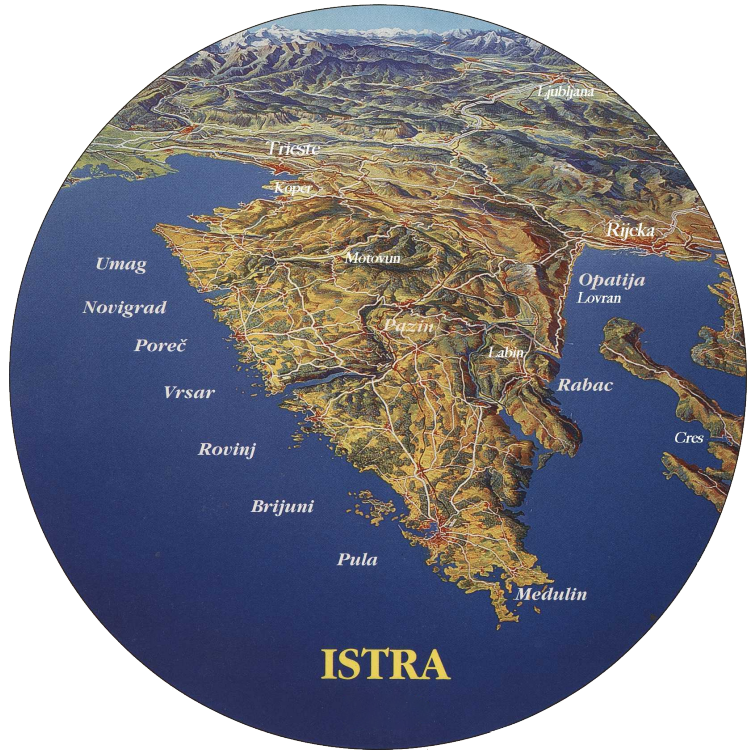
Map of the Istrian Peninsula
About the Istrian-Peninsula, Croatia
Almost triangular in shape this area of Croatia shares a border with Slovenia and juts out into the Adriatic Sea in the north west of the country providing a truly stunning holiday destination. Not only are the many coastal resorts of interest but so is the interior of the region. Sparking clear seas all around the coastal area make this region a popular choice as a family holiday destination.

Sveti Andrija - The island of Saint Andrew off the Istrian coast.
Located on the 45th parallel, it is half way between the Equator and the North Pole, Istria enjoys an ideal geographic and temperature position in the northern hemisphere.
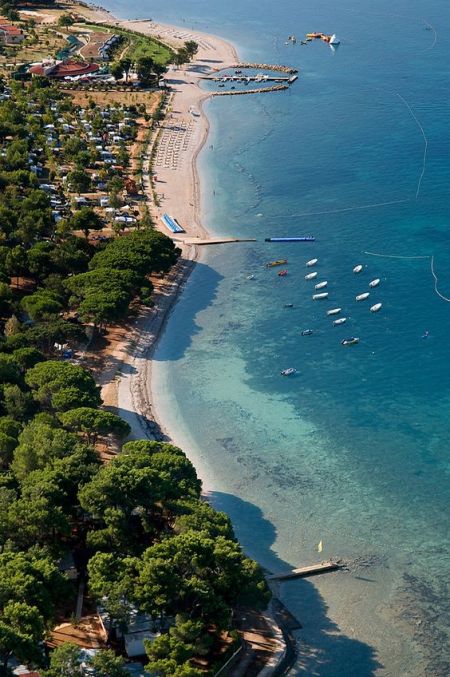
Valbandon beach-Fazana.
The climate is mild, Mediterranean, with warm and dry summers and mild and pleasant winters. It has an average of 2,338 sunny hours per year, and 10 hours of sun per day during the summer. The average air temperature during the coldest part of the year is 6°C and 30°C during the warmest.
The lowest sea temperatures are recorded in March, with an average of 9°C, while the highest temperatures are recorded in August, reaching up to 25°C.
Life along the coasts of Istria has always been closely linked to the sea. Seafarers found shelter in the coves' embrace, fishermen valued such mysterious wide open spaces throughout their entire life, and travelers discovered new loves in its harbors. And they will all agree on one thing - the beauty of the Istrian landscape has enchanted many a traveler convincing him to stay and have a new start…
Culinary Istria
Black and White Truffles

Istria - Black and White Truffles
Inland Istria is also well known for its truffles. Not only the usual black variety but white truffles are also found in the area and are very highly prized. There are specialist shops which offer every kind of truffle delicacy. These are really worth a visit.
The Tuber brumale variety is the common black truffle and grows in the winter time. Tuber Aestivium is also a variety of the black truffle that grows throughout the year.

Istria - Black and White Truffles
Tuber Melanosporum is the fine black truffle that grows from January till spring and is regarded as the best among the black varieties. This truffle is the priciest among the black varieties.
The fine white truffle called Tuber Magnatum Pico the priciest among truffle. It grows from September till January and is eaten fresh usually shaved over hot steaming pasta, meat or fish. For this couture gastronomy treat get ready to pay a heftier price tag.
Istrian Wine

Istrian Malvasia, Istrian Malvasija
The central area is mainly covered in quite scrubby woodland but it also offers some great vineyards which produce excellent quality wines. The main white wine is Malvasia but there are also some very good quality red wines. Malvasia is the perfect drink for a warm summer evening served chilled. Known also as Malvasija – local spelling.
Fish
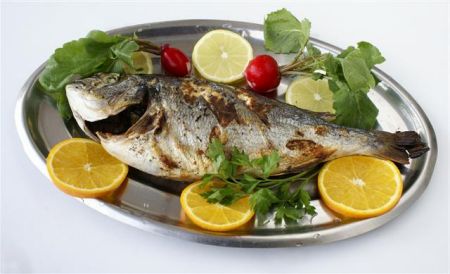
Orata/Orada (English = gilt-head bream)
Check out the Oradas as they are a really super fish to eat and available everywhere. Also spellled Orata (English = gilt-head bream)
The gilt-head bream is generally considered the best-tasting of the breams.
AKA -
- Orata (golden) in Italian
- Goldbrasse in German
- Denees in both Hebrew and Arabic
Inland Istria

Buzet
Inland Istria not only offers superior cuisine, it also is a favored destination for nature lovers as well as history buffs.
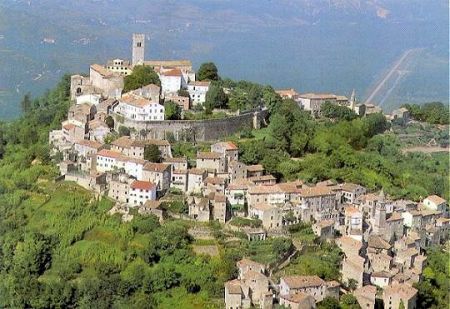
Motovun
Buzet
The hilltop settlement of Buzet in the north of the region is also well worth exploring.
Motovun
Motovun with its hilltop setting is Italian in style and reflects the architecture found in many Italian hilltop towns just across the Adriatic.
Costal Istria

The Lim Channel - Lim Fjord
However, the main tourist destinations are on the coast. All the coastal towns and villages are perfect as summer holiday destinations and they are steeped in a rich history. The Romans created large settlements along the entire coast of Croatia and the large amphitheatre in Pula in the south of the region bears testament to their presence.

Pula - Roman Amphitheater
The Romans were so fascinated by this wonderful coast line that the Roman Emperor Diocletian built a palace in the coastal resort of Split although that is well south of the Istrian peninsula.
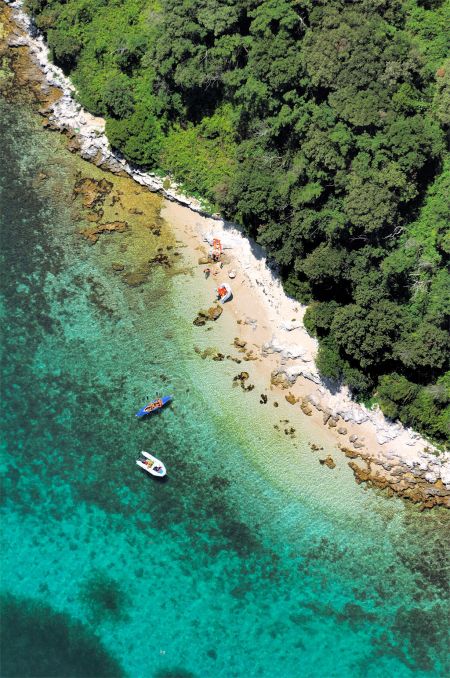
Istrian Beaches, Croatia
For the most part the beaches are quite gritty or pebbles but the sea is absolutely crystal clear and very warm in summer. There are a few sandy beaches but not that many. The warm crystal clear waters attract large numbers of holidaymakers from all over Europe in the summer months so an early booking in the main holiday periods is advisable.
Whilst there are lots of hotels there are far more holiday apartments and holiday homes available for rental and the vast majority of holiday visitors go for this option. There are also innumerable letting agencies everywhere and so should you decide to invest in a holiday home or apartment then finding a local agency to handle the lets in your absence is very easy.
As for the coastal resorts . . . .
Umag

Umag
Umag lies on the north-western coast of Istria. Lush beautiful hills provide a magnificent backdrop to crystal clear waters, exciting history, agricultural specialties and friendly locals.
Situated on a headland and offering a wonderful yacht harbour this popular resort offers everything for the family holiday. Long beaches, sailing, hotels and restaurants as well as adequate shopping are all to be found here.
Cultural attractions:
- The Umag town walls,
- The Museum,
- The Savudrija lighthouse.
Novigrad

Novigrad
One of the smaller resorts along this coast but it is renowned for its high quality sea food restaurants. It has an interesting harbour and the resort offers the usual range of seaside and holiday amenities.
Novigrad Marina is on the West coast of Istria in a town with rich historical and cultural heritage and one of the top Istrian gourmet destinations. Novigrad is, thanks to its long fishermen’s tradition, closely connected to its local population which gathers in the Mandrač bay even today, enjoying the sea food and everyday socializing with good wine and great music.
Also worth seeing are the baroque Rigo Palace of Novigrad and the seaside promenade extending along the coast to the Novigrad marina.
Poreč

Poreč.
A city with over 2000 years of history. A wonderful place to explore with a great many interesting shops and alleyways. Good restaurants and offering just about everything that a holiday with the family requires.
Poreč is, located in the heart of the western coast of Istria. A town of culture, tourism, sport and entertainment, it is renowned for the beauty of its public.
Poreč grew from a small coastal settlement into an attractive tourist destination distinct for the great care put into the beauty of its public spaces, a diverse offering of events and activities as well as facilities tailored to each individual guest.
Vrsar

Vrsar - Arial view

Vrsar - Marina
Vrsar abounds in beaches whose beauty springs from the charm of the coastal landscape where rocks and tiny pebbles mix.
The sea landscape of Vrsar is dominated by an Archipelago of 18 islets, scattered along an indented coastline woven from wooded bays, capes and coves.
As the waves lap the bluest lagoons, they play a true Adriatic rhapsody which sooths every soul and fills it with exceptional beauty.
Rovinj
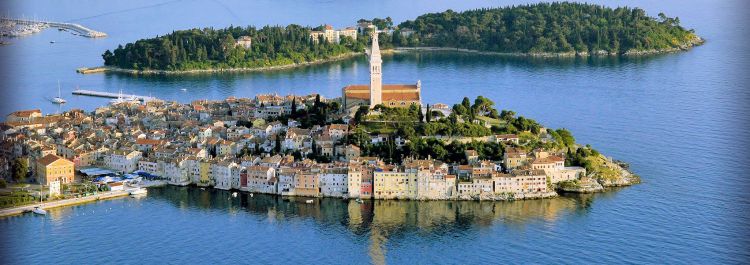
Rovinj

Romantic Rovinj
With its population of around 14,000 people it is one of the largest towns along the Istrian Riviera. It has a long history dating back to the Byzantine era as well as to Roman times. Originally an island but the gap between the island and the mainland was filled in and so it is now a small peninsula.
Shops, hotels, restaurants and a location steeped in centuries of history make this a top location in Istria.
There is something particularly romantic about Rovinj (roh-VEEN). Some locals credit the especially strong Venetian influence here — it's the most Italian town in Croatia's most Italian region. Rovinj's streets are delightfully twisty, its ancient houses are characteristically crumbling, and its harbor still hosts a real fishing industry.
Croatia’s romantic Rovinj is like a little Venice on a hill.
Fažana
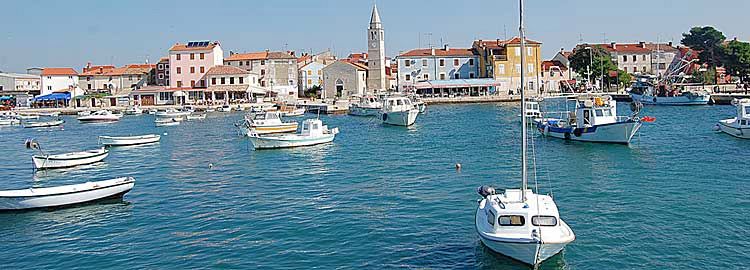
Fažana
This is smaller and more intimate. Primarily a small fishing port with a very long history.
It is the main departure point for the nature reserves on the Brijuni Islands which lie just off shore. They offer beaches, pine woods; waterfront promenades and restaurants along the sea front are the perfect place for rest and recreation
.Pula

Pula marina
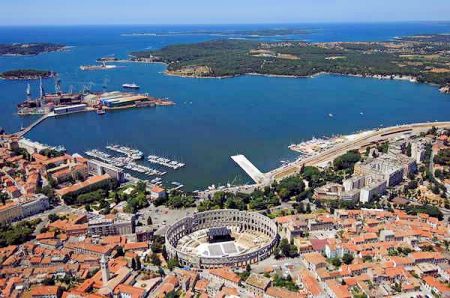
Pula
Located at almost the southern tip of the Istrian peninsula, Pula is a bustling and very active market town - and again - with a very long history.
The main and best known feature is its Roman amphitheatre which still plays an important role in the town’s activities.
A visit to Istria is not complete without a visit to Pula.
Medulin

Medulin
Right at the southern tip of the peninsula Medulin is very much a family holiday region. Somewhat quieter offering good hotels and secluded beaches it is an area not to be overlooked.
A very good area for young children to enjoy its attractive beaches.
Rabac & Labin

Rabac
Combining an ancient hilltop town with a seaside resort this could well be described as a ‘classy’ area of the Istrian peninsula.

Labin & Rabac
Hotels, restaurants as well as the entire usual infrastructure this region is worth some serious exploration.
There are attractive holiday apartments for sale throughout the region as well as smart holiday villas with private swimming pools. The old traditional stone houses are also a popular purchase as they have so much original character.
Rabac is also a paradise for yachtsmen and hobby sailors.

Labin
Properties for sale in:
The town of Novigrad and vicinity
The town of Poreč and vicinity
The towns of Vrsar, Funtana and vicinity
The town of Rovinj and vicinity
The port of Fažana and vicinity